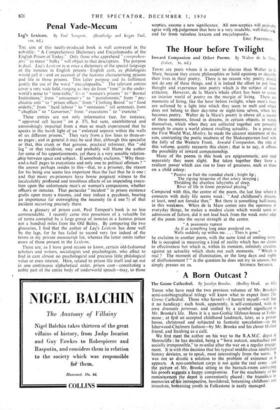Penal Vade-Mecum
Lag's Lexicon. By Paul Tempest. (Routledge and Kegan Paul.
los. 6d.)
THE aim of this neatly-produced book is well conveyed in the sub-title: " A Comprehensive Dictionary and Encyclopaedia of the English Prison of Today." Only those who apprehend "comprehen- sive " to mean bulky " will object to that description. The purpose is dual. Lag's Lexicon is at once a dictionary of the special language of the inmates in English prisons—English cant, as philologists would call it—and an account of the features characterising prisons and life in those prisons. This latter purpose and its fulfilment justify the use of the word " encyclopaedia." The relevant entries cover a very wide field, ranging as they do from "time" in the under- world's sense to time-table," from " women's prisons " to " Borstal Institutions," from " amusements " to " punishments," from " psy- chiatric unit " to " prison officer," from " Clothing Board " to " food orderly," from " hard labour " to " remission " (of sentence), from " chaplain " to " Governor," from " executions " to " exercise."
These entries are not only informative (see, for. instance, " approved cell layout " on p. 37), but sane, unembittered and astonishingly impartial from a man so much experienced that he speaks in the harsh light of an " enforced sojourn within the walls of six different prisons." They vary from a few lines to three-or- so pages ; and in general it may be said that, although this specialist or that, this crank or that genuine, practical reformer, this " old lag " or that recidivist, may and probably will blame the author for some of his apportionments, yet there is a very sensible relation- ship between space and subject. If somebody exclaims, " Why three- and-a-half pages to executions and only one to political offences ? " the answer perhaps resides in this—that, to a prisoner, the reason for his being one seems less important than the .fact that he is one ; and that many ex-prisoners have borne poignant witness to the incalculably profound and troublous effects of an impending execu- tion upon the unfortunate man's or woman's companions, whether officers or inmates. That particular " incident " in prison existence grafts upon many a trauma, and may induce a psychosis, bearing an importance far outweighing the necessity (is it one ?) .of that incident occurring precisely there.
As a glossary of prison cant, Paul Tempest's book is no less commendable. I recently came into possetsion of a valuable list of terms compiled by a large group of inmates in a famous prison not a hundred miles from the Old Bailey. By comparing the two glossaries, I find that the author of Lag's Lexicon has done well by the lags, for he has failed to record very few indeed of the terms in my private manuscript list, whereas the latter omits rather more of those present in the Lexicon.
There are, as I have good reason to know, certain old-fashioned scholars and writers, sociologists and psychologists, who affect to find in cant almost no psychological and precious little philological value or even ihterest. Here, related to prison life itself and set out in one continuous alphabetical order, prison cant—constituting a noble part of the entire body oP underworld speech—may, to those sceptics, assume a new significance. All non-sceptics will probably agree with nto,judgement that here is a very readable, well-balaace4, and far from valueless lexicon and encyclopaedia.
ERIC PARTRIDGE.






































 Previous page
Previous page